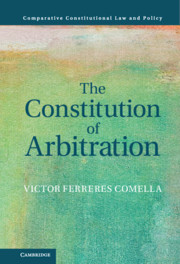Book contents
- The Constitution of Arbitration
- Comparative Constitutional Law and Policy
- The Constitution of Arbitration
- Copyright page
- Dedication
- Contents
- Acknowledgments
- Introduction
- Part I Arbitration and Private Law
- Part II Investment Treaty Arbitration
- Part III State-to-State Arbitration
- 10 The Arbitral Foundations of International Adjudication
- 11 The Virtues and Limitations of State-to-State Arbitration
- Afterword
- Index
11 - The Virtues and Limitations of State-to-State Arbitration
from Part III - State-to-State Arbitration
Published online by Cambridge University Press: 11 March 2021
- The Constitution of Arbitration
- Comparative Constitutional Law and Policy
- The Constitution of Arbitration
- Copyright page
- Dedication
- Contents
- Acknowledgments
- Introduction
- Part I Arbitration and Private Law
- Part II Investment Treaty Arbitration
- Part III State-to-State Arbitration
- 10 The Arbitral Foundations of International Adjudication
- 11 The Virtues and Limitations of State-to-State Arbitration
- Afterword
- Index
Summary
State-to-state arbitration offers some potential advantages as a dispute-resolution mechanism. These advantages are similar to those arbitration displays in other settings, having to do with specialization, procedural flexibility, speed, and confidentiality. The chapter examines some of the strengths and weaknesses of state-to-state arbitration. It also discusses the arbitrability of peremptory norms of international law (ius cogens), the interaction between arbitrators and the International Court of Justice in the lawmaking process, and the extent to which arbitration is likely to be avoided as a procedure to settle disputes among member states of a supranational organization.
Keywords
- Type
- Chapter
- Information
- The Constitution of Arbitration , pp. 196 - 213Publisher: Cambridge University PressPrint publication year: 2021

